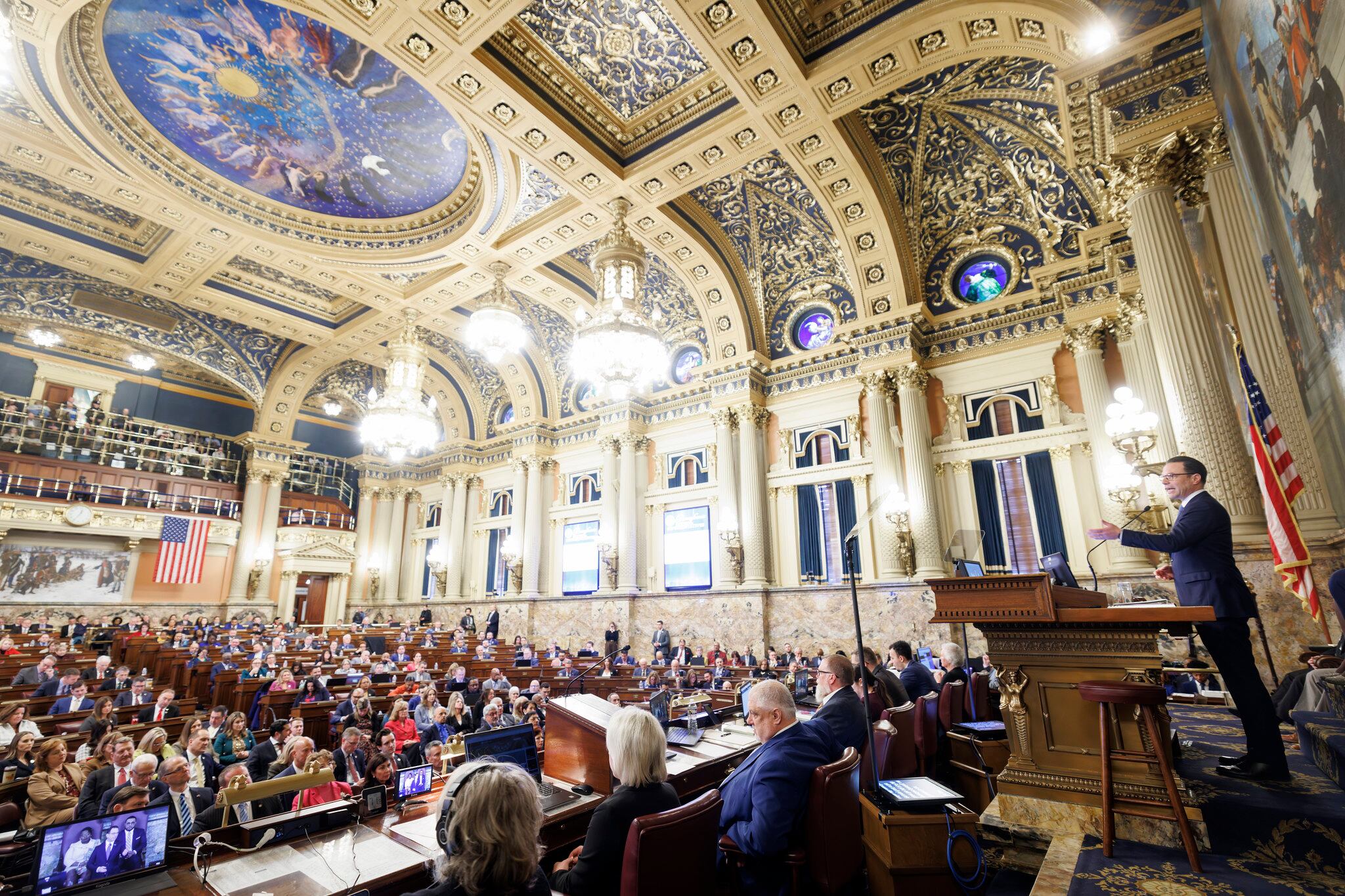Story by Spotlight PA’s Stephen Caruso and Katie Meyer
Investigative and public service journalism produced by the independent, nonpartisan, nonprofit newsroom Spotlight PA holds Pennsylvania’s leaders accountable and promotes constructive change.Subscribe to our newsletters for free.
HARRISBURG The state budget for Pennsylvania will be late for the fourth consecutive year.
Deals in Harrisburg are frequently postponed for a week or two while politicians iron out the last details. However, the intensity of the present disputes may prolong this standoff. Delays can also have serious repercussions for publicly supported services, such as child welfare programs, schools, and libraries, as previous impasses have demonstrated.
State House Democrats, state Senate Republicans, and Democratic Governor Josh Shapiro’s top lawmakers and staff have been meeting behind closed doors. However, Senate Majority Leader Joe Pittman (R., Indiana) warned reporters last week that they will need to work through extremely fundamental philosophical disagreements in order to come to an agreement for the upcoming fiscal year, which starts on July 1.
It is laborious and slow-moving, Pittman continued.
Despite having a $11 billion budget surplus right now, Pennsylvania has been blowing through it steadily, largely due to the state’s long-standing structural deficit—that is, spending more annually than it brings in.
Democrats who control the state House, like Shapiro, want to utilize the $5 billion from the surplus to support what they consider to be fundamental necessities, such as boosting financing for K–12 education, saving troubled public transportation systems, and preserving health coverage for those with low incomes.
In order to avoid future tax increases, the Republicans who control the state Senate want to cut or at least restrict the rise of this spending.
Few proposals for revenue are on the table. Regulating and taxing skill games—the slot-like machines that have appeared in bodegas, bars, and VFWs around the commonwealth—is one feasible solution. However, a contentious dispute between Republicans in the state Senate and the game’s creators and supporters has raised doubts about the likelihood of a resolution.
Despite transit companies like Philadelphia’s SEPTA having a limited amount of time to avoid severe service cuts and human care providers facing increasing uncertainty, it is possible that a deal won’t be concluded for days or even weeks due to these conflicting views.
Leading policymakers from both parties claim that the delay is a necessary aspect of conducting business.
House Appropriations Committee Chair State Representative Jordan Harris (D., Philadelphia) stated, “We would love to have that deal done on June 30.” However, if that agreement represents our values and is made just a few days after June 30, I believe it will benefit the entire state of Pennsylvania.
Pittman added: We have already seen this film, and when the sun rises on July 1, I doubt that the decent people of Pennsylvania will notice a significant change in their day-to-day existence.
Although the state is required by the constitution to pass a balanced budget by June 30 of each year, operations are usually not significantly disrupted if that deadline is missed by a few weeks.
The budget is divided into two main sections. One is a spending plan, which serves as a guide for the commonwealth’s fiscal year revenue collections and expenditures. One or more code bills, which are pieces of legislation that detail how money is spent and may include dozens of policy changes, make up the other.
The Commonwealth has a number of responsibilities, including paying its portion of federal programs like Medicaid and paying its employees and debts, even in the absence of a spending plan.
Only if a budget plan delay continues into a weeks-long standstill will schools and county agencies, such as child welfare offices, mental health, and addiction treatment, be in a tight spot. In the past, libraries and community colleges have been among the smaller groups of financial recipients who have suffered from late code bills.
However, the specifics of the budget negotiations will determine all of this.
The state last saw the full impact of late budget consequences in 2023, during Shapiro’s first year of negotiations, when negotiations broke down over whether to use taxpayer funds to pay for private school vouchers. It wasn’t until early August that lawmakers passed a budget.
Tens of millions of dollars in payments to community colleges, public universities, special education programs, and daycare and preschool programs were missed by the state in the interim.
These programs usually have some reserves that enable them to withstand a missing state payment or two, as do other state-funded entities like county child welfare offices. Longer delays, however, may lead them to begin reducing services or borrowing money.
Most people didn’t have to wait that long in 2023. After the budget plan was approved in August, the majority of the state’s regular spending resumed.
But that year, lawmakers were still unable to agree on important code bills that would have authorized spending above $1 billion. Funding for public defense, libraries, underprivileged school districts, community colleges, and a well-liked home repair program were among the items that were put on hold.
While they awaited a compromise from the lawmakers, these unfortunate groups had to tighten their belts. At the time, a community college administrator told Spotlight PAat that universities were forced to borrow money or draw from reserves. According to a Poconos library director, she had to reduce programs.
When tensions finally subsided in November, Shapiro approved several of the expenditure items that had been put on hold, including a bill that would have increased ambulance service reimbursements. However, it wasn’t until mid-December, six and a half months after the deadline, that the deal was completely concluded.
A history of impasses
Such budgets are not uncommon, but they are also not the norm.
The state has enacted 13 late budgets in the last 20 years. The budget for this year is probably going to be on the 14th.
(For this count, Spotlight PA considers a budget to be enacted if lawmakers have accepted a complete spending plan and allowed the majority of state funds to continue flowing, even though the deal may not be finalized as it was in 2023.)
Two of those spending plan delays, in 2009 and 2015, lasted longer than 100 days, although the majority were brief. Relationships in Harrisburg and, in the case of the 2009 deadlock, state legislation were both permanently impacted by those protracted deadlocks.
As the states battled to deal with a budget shortfall throughout the Great Recession, Democratic Governor Ed Rendell, a Democratic-controlled state House, and a Republican-led state Senate garnered national attention for a 101-day standoff in 2009. Rendell advocated tax increases. Republicans sought to reduce expenditures. And although the state failed to pay K–12 schools, social services, and several other programs for months, neither side faltered.
Before Rendell signed a partial deal that permitted them to restart operations, state employees also missed salaries and agencies effectively shut down in July, sparking protests in the Capitol.
The state Supreme Court decided that the federal Fair Labor Standards Act superseded state constitutional provision stating that the majority of state funds could not be spent without an established budget, causing a significant shift in the Commonwealth as a result of that disruption. State employees no longer had to go without pay because of an impasse.
Although state employees were relieved, one of the strongest deterrents to a late deal was eliminated as a result.
However, the 2009 standoff wasn’t the worst Harrisburg has seen in a long time. Former Democratic Governor Tom Wolf oversaw a record nine-month standoff in 2015 while serving his first term and dealing with a legislature that was entirely controlled by Republicans.
The deadlock of that year was quite similar to that of 2009. Wolf sought to raise taxes, but Republicans steadfastly opposed it since Pennsylvania was still having financial difficulties. Other government-funded services suffered, although state employees continued to receive their salaries.
Schools were one of them. Some were forced to cancel extracurricular activities, electives, and tutoring.Domestic abuse centers also had to deal with temporary shutdown, as did state-subsidized pre-K programs.
Additionally, Wolf’s popularity ratings temporarily declined, and the event influenced state politics for the remainder of his term. Wolf failed to persuade the legislature to increase sales or income taxes during his two terms in office, despite a persistent structural deficit, and there haven’t been any significant attempts to do so since.
Few Harrisburg lobbyists anticipate another record-breaking stalemate this year, but many are worried about a standoff that may last into the fall.
Regardless of the deadline, rank-and-file politicians find the procedure unpleasant because they must wait for leaders to reach an agreement in private negotiations before swiftly considering and voting on that proposal, frequently within hours.
State Representative Jason Ortitay (R., Washington) told Spotlight PA, “I wish we’d start the process a lot sooner.”
Because no one says it, even though everyone knows the legislature won’t meet the deadline, Ortitay continued.
PRIOR TO GOINGPay it forward by making a donation to Spotlight PA atspotlightpa.org/donate if this article taught you anything. Foundations and readers like you who support results-driven, accountability journalism provide funding for Spotlight PA.
Stories from Spotlight PA
-
Opioid funds, public voices: What Spotlight PA heard and learned by listening to you
-
How much do you know about Pa. s medical marijuana program? Take our quiz.
-
Pa. college with a budget gap is selling its art collection, but it might not be worth that much
-
GOP leaders accused of pressuring lobbyists to drop gaming client in ugly Pa. budget fight






